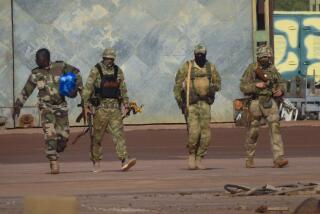U.S. Sees Soviet Role in Angola Push : Africa: Advisers are supporting the Marxist regime’s ‘dangerous’ offensive, the Administration says.
- Share via
WASHINGTON — Despite relaxation of East-West tensions, Soviet advisers in Africa have been sent into battle to support an offensive by the Marxist government of Angola to capture territory long held by pro-Western rebels, the Bush Administration said Monday.
State Department spokeswoman Margaret Tutwiler described the attack, by several thousand Angolan soldiers using tanks and other armored vehicles, as a “dangerous escalation” of the 14-year-old Angolan civil war. The war was thought to have been settled last June with a truce mediated by President Mobutu Sese Seko of Zaire.
“That this offensive action is receiving close support from a substantial number of Soviet military advisers at the front line is increasing our concern,” Tutwiler said.
Another State Department official, requesting anonymity, added: “It appears that Soviet military assistance is continuing at a massive level.”
The offensive began Dec. 23 when Angolan government forces began an advance toward Mavinga, a town of about 13,000 people that has been held for years by rebels of Jonas Savimbi’s Union for the Total Independence of Angola, known as UNITA from its initials in Portuguese. UNITA controls much of the sparsely populated southeastern part of the country.
The Administration’s sharp criticism of Soviet involvement in the African fighting mirrors Moscow’s condemnation of the U.S. invasion of Panama. Despite the overall improvement in U.S.-Soviet relations, each superpower remains deeply distrustful of the other’s activities in the Third World.
A State Department official said there are about 1,000 Soviet military advisers in Angola, although not all of them are involved in the fighting around Mavinga. The Soviets are providing advice on tactics and maintaining Soviet-supplied armored vehicles.
Tutwiler said the offensive began “at a time when UNITA is prepared to agree to a cease-fire and unconditional negotiations. We therefore urge Luanda (Angola’s capital) and the Soviet Union to stop the offensive immediately and concentrate instead on the peace process.”
The other official said that UNITA forces appear to be holding their own.
“For a long time we have been of the opinion that there is no military solution to the Angola situation” because the two sides are so evenly matched, the official said. “They’re just wasting time and losing more Angolans in the process.”
Savimbi and Angolan President Jose Eduardo dos Santos agreed on a truce last June after intense mediation by Mobutu and other African leaders. The agreement led to the withdrawal of Cuban troops from Angola and cleared the way for independence for neighboring Namibia. But disputes over the terms of the Angolan cease-fire began almost as soon as it was signed.
Despite the offensive, Tutwiler cited recent statements by the Angolan government that “Dos Santos may be prepared to discuss seriously some of the key issues in the Angolan national reconciliation process. We welcome this development and urge the MPLA (the governing party) to take its proposals to the mediator, President Mobutu, who continues to have our full confidence.”
More to Read
Sign up for Essential California
The most important California stories and recommendations in your inbox every morning.
You may occasionally receive promotional content from the Los Angeles Times.













